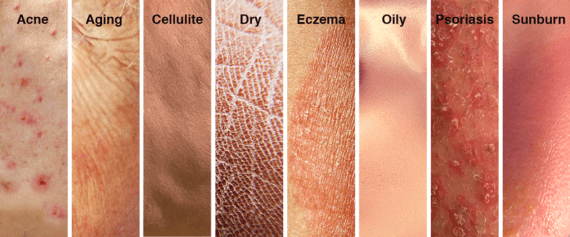- Your cart is empty
- Continue Shopping
What is Skin Care?
Skincare is a versatile range of processes that support the integrity of the skin, enhance its appearance, and keep it safe from different skin conditions. Nutrition, controlling excessive exposure to the sun and the use of appropriate emollients play an important part in skincare.
To understand skincare, we first have to understand what is the skin itself.
 What is Skin?
What is Skin?
Skin belongs to the integumentary system, which is the largest organ of the body. This system includes:
- Skin
- Hair
- Nails
- Glands
- Nerve receptors
Functions of the Skin
Skin not only gives beauty to our body, but it also performs very vital physiological functions. These include:
- Protection: It protects us from harmful ultraviolet radiation and sunburn.
- Regulation: It regulates body temperature by controlling the movement of fluids and excretion of wastes.
- Defense: It forms a defensive barrier against bacteria, viruses and other harmful microbes.
- Storage: Important nutrients like fat, glucose, water and Vitamin D are stored in the skin layers.
Layers of the Skin
Skin is made up of 3 layers, which are;
- Epidermis: The epidermis is the topmost layer of the skin. It does not contain any blood vessels. It contains keratin that makes our skin waterproof and contains melanocytes, cells which determine the color tone of our skin.
- Dermis: The dermis is the middle layer of the skin. It consists of supportive connective tissues. It has blood vessels and nerve endings in it. Hair, oil and sweat glands are also present in this layer. Lymph vessels providing WBC to this area help combat infection.
- Hypodermis: Also called the subcutaneous layer, the hypodermis is the deepest layer of the skin and consists of adipose tissues, where fat is stored. It provides cushion and protection to the internal organs. Blood vessels, lymphatics, nerves and hair follicles are also embedded in this layer.
Types of Skin
There are 4 types of skin, and the best way of caring for each of them varies.
- Normal Skin: It is also called a eudermic skin. It signifies healthy and well-balanced skin.
- Dry Skin: This skin type produces less sebum (fats) than normal. This results in dryness due to a lack of the lipids that are responsible for retaining moisture and protecting the skin from external influences.
- Oily Skin: Oily skin is the way it is because of an overproduction of sebum. This is known as seborrhea.
- Combination Skin: People with combination skin have a mixture of skin types.
The health of your skin will depend upon the environment, your physical and mental health, and the skin care products you choose to use.
Experts and dermatologists prescribe appropriate skin care treatments according to your skin type and the condition of your skin. Before starting skin care products or treatment, the following factors must be considered to determine your skin type condition.
Signs of Aging
- Skin color
- Skin sensitivity
- Sebum and sweat production
- Natural moisturizing factors
Based on these factors and your skin type, basic skin care can be broadly divided into 2 categories:
- Routine skin care
- Medical skin care
What are the causes leading to conditions requiring skin care?
There are many internal and external influences we encounter throughout our lives that makes skin care an integral part our health regimes. Major factors include:
- Climate
- Pollution
- Stress
- Hereditary factors
- Aging
- Hormonal changes
All these factors affect the levels of sebum, sweat and moisturizing factors, that lead to skin conditions that require medical skin care.
Signs and Symptoms
Although different skin conditions may have specific presentations, common signs and symptoms include:
- Itching
- Swelling
- Redness
- Rashes
- Flaky, scaly skin
- Blisters
- Oozing
- Bumps or growths
Treatment
As mentioned above, skin care is divided into 2 categories. One that is routinely done, an everyday procedure undertaken at home to ensure your skin looks and functions its best. The other type of skin care covers treatments due to some skin condition affecting the health of your skin.
Routine Skin Care Treatment
Depending upon our skin types, here is a general outline as to how to maintain a healthy habit of good skin care.
Dry Skin
Dry skin requires products that hydrate and prevent excessive water loss from the skin.
- Cleanse: Use cleansing oils and lotions to remove dirt and makeup. This prevents moisture loss from the skin.
- Treat: Boost your skin’s hydration by using hydrating serum or essence.
- Moisturize: For locking in water, use a protective cream with ingredients like oils or shea butter.
- Finish: End your routine with a high-quality sunscreen which provides moisture and protection.
Oily Skin
Oily skin requires products that clarify and mattify to prevent breakouts and minimize the shine.
- Cleanse: Use gentle cleansing formulas. Strong formulas cause sebum overproduction, so it is best to avoid them.
- Treat: Use an exfoliating agent to open sebum clogged pores and to wash away dead cells.
- Moisturize: Use lightweight, hydrating cream or gel to moisten your skin.
- Finish: Apply sunscreen for skin protection and damage control.
Normal Skin
Normal skin requires products that keep a balance between hydration and moisture levels.
- Cleanse: Use a mild cleanser to remove dirt and makeup.
- Treat: Apply AHA, BHA or retinol to exfoliate 2-3 times a week for glowing skin.
- Moisturize: Use light or medium weight lotion with emollients like almond oil for maintaining skin hydration.
- Finish: Select any sunscreen formula that suits you.
Combination Skin
This type of skin requires mild formulas to find a balance between dry and oily areas.
- Cleanse: Use a gentle, balanced formula.
- Treat: Use mattifier on your T-zone and hydrating serum all over.
- Moisturize: Use a lightweight liquid or gel solution.
- Finish: Use an oil-free sunscreen.
Medical Skin Care Treatment
Common medical skin care treatments include:
- NSAIDs
- Antivirals
- Antifungals
- Antihistamines
- Corticosteroids
- Light therapy
- Surgery
The skin condition you are diagnosed with will determine the appropriate treatment. You will be prescribed the medical skin care products accord to your diagnosis and at the judgment of your doctor of other health care professional.
References:
IMPORTANT NOTE: The above information is intended to increase awareness of health information and does not suggest treatment or diagnosis. This information is not a substitute for individual medical attention and should not be construed to indicate that use of the drug is safe, appropriate, or effective for you. See your health care professional for medical advice and treatment.


